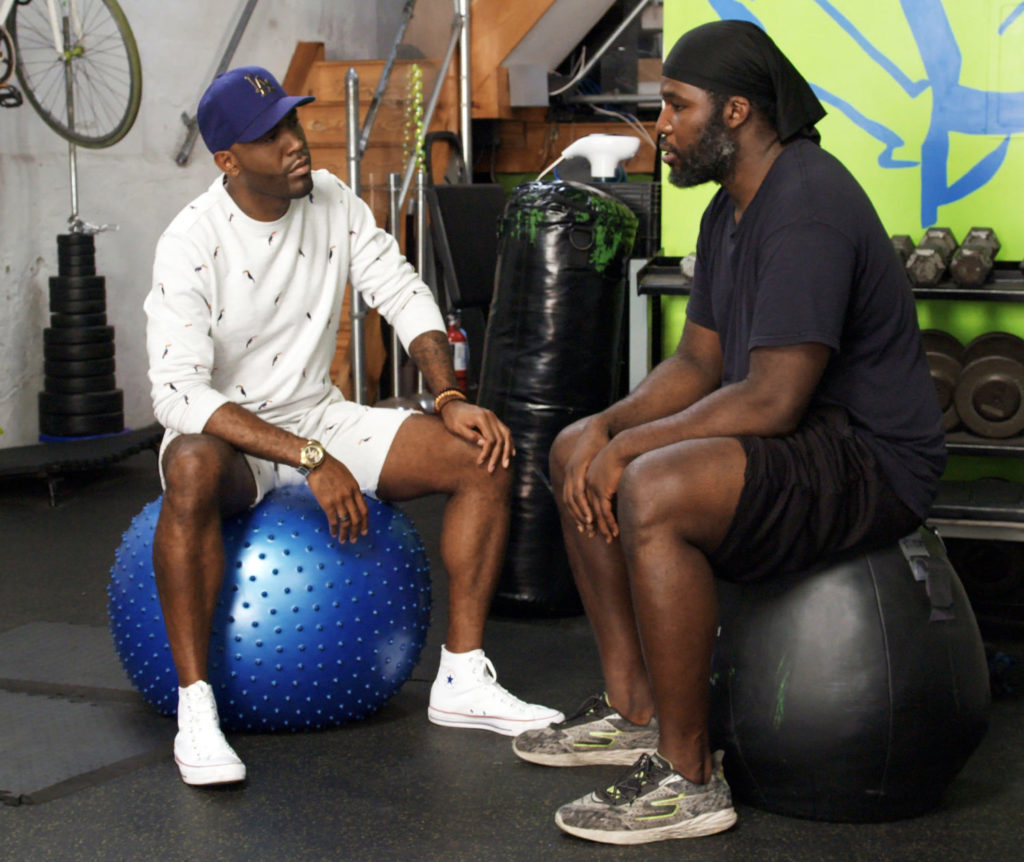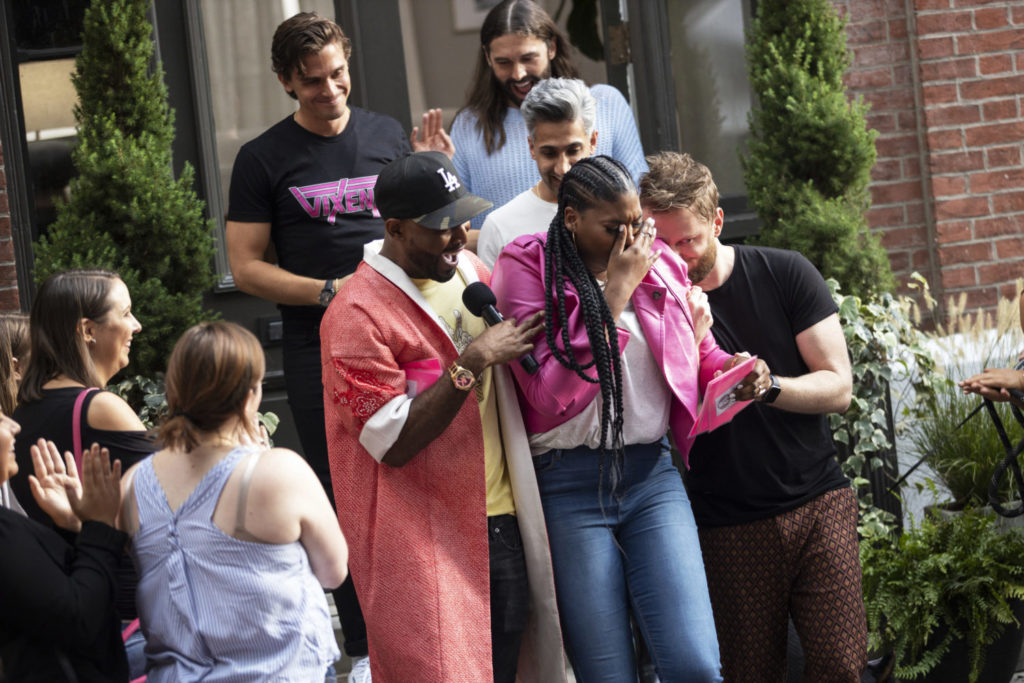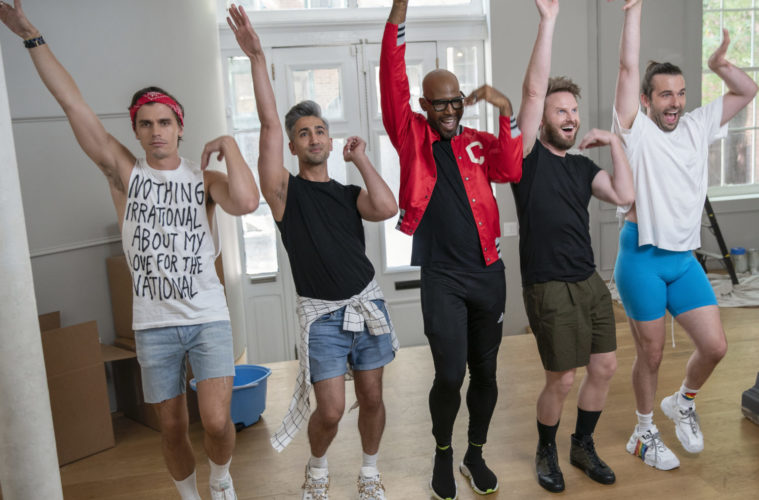The Fab Five are back! Five seasons in, Netflix’s Queer Eye continues to be a cultural phenomenon, providing life transformations to people from all walks of life across America. From home and self improvement, to fashion and food, the show continues to be a joy to watch, learn from and feel good about. But its most powerful moments usually deal with what’s inside not outside, and uncovering what might be blocking one’s desires to lead a fulfilling life. These moments — the ones that usually make us cry — are what make Queer Eye more than another makeover exercise with funny quips about hair products (though Q.E.‘s Jonathan Van Ness grooming gab is priceless).
Though he’s labeled as the queer guy in charge of “culture” on the show, Karamo Brown not only helps people connect with where they come from, he helps them be honest about how their past experiences have affected their lives and created barriers. Like a therapy session with your best (gay or not) friend, the L.A.-based well-being expert has a way of comforting and understanding that never feels contrived and clearly allows for real breakthroughs. In advance of Queer Eye‘s season 5 debut today, L.A. Weekly spoke with Brown about the show, Pride month and the current issues our country faces. Just as he does on the show, he provided some helpful tools and hopeful thoughts for coping and creating change in ourselves and the world.
L.A. WEEKLY: You are really uplifting to watch and we are really happy to get to chat with you. Lately the world has left a lot of us feeling defeated, first with COVID-19 and then the quarantine and now with the racism we all saw highlighted on video and the unrest that’s followed. This is kinda a heavy thing to ask off the bat, but what words can you provide or even tips on how to keep our faith in humanity right now?
KARAMO BROWN: I think before we can have faith in humanity we have to have faith in ourselves, and you know, that’s something that I explain every season of Queer Eye. Now it’s more relevant than ever. It starts with self and home, and then it spreads out in the world and that’s when the world begins to get stronger and healthier. So I would really tell people to first check in with themselves and whether it was during COVID, which is still happening, or whether we are starting to pay more attention to the injustices happening to African Americans through these riots, it’s saying to yourself, you know I wanna be a part, I wanna learn, I wanna do, but if I’m not OK today mentally or emotionally it’s OKto take a step back, recharge and then come back the next day.
I think what happens with a pandemic or in a national tragedy is that we feel as if our emotions are heightened and we have to be aware consistently and engage in all information consistently. That’s actually not the healthiest way to push yourself or to help the pandemic get better or to support African Americans that are fighting.
So what is a healthier way?
It’s really about checking in and saying OK, I can do this today but I’m feeling really triggered by all the videos I’m seeing or I’m feeling overwhelmed by all the information I’m getting, and re-evaluating and coming back stronger the next day. I think that’s really the key first step. I think after you have checked in with yourself, you have to then say ‘If I want to stand for people getting better when it comes to the pandemic or I wanna stand for African Americans and say yes, I see you and I hear you,’ then you have to the say to yourself, ‘I understand what allyship should be, because I don’t think a lot of people understand what allyship truly is.’
So how can we support each other and be the best allies we can be right now?
It doesn’t mean that you’re speaking for someone else, it means that you’re just amplifying those who normally don’t have a voice. I think the immediate thing that people do is re-posting on social media which I think is awesome and it’s critical to show people who are not respecting the pandemic and still people who are not respecting the unity of life.
But allyship also means that there’s somebody who you’re in close proximity to that you can ask, ‘What do you need me to amplify for you?’ Cause I think that a lot of times allyship becomes, ‘Will you teach me what to do?’ And there’s a difference when saying ‘What can I amplify for you?’ So with that, it takes the pressure off of somebody teaching you and them giving you directions and I think that there’s an important distinction there and that way now you’re checking with yourself and saying, ‘Hey, OK I can amplify for someone today… I feel strong enough.’ Those are really good ways to keep your mental and emotional state good while also being able to be there for others and the people who might say, ‘I’m tired so can you pick up the slack by amplifying because you are an ally for me.’

QUEER EYE (L to R) KARAMO BROWN and NATE MCINTYRE in episode 510 of QUEER EYE. Cr. NETFLIX © 2020
So amplification is key, isn’t it?
What I’m about to say might sound as if there’s an excuse or a pass to anyone but it’s really the problem that we are fighting for with the injustices for both African Americans, Latinos, Asians… all of us together. These are not problems we started, so it’s one of those things where it’s like, ‘I wasn’t around when the Constitution was being put together, I wasn’t around when 20 generations back they took over the U.S. and there were genocides and all that.’ We weren’t around for the civil rights movement so we are here now and we have inherited these problems and we’re like OK we have inherited the problems but no one really gave us the solutions.
It’s the same thing with people’s emotional and mental state — you inherit these traumas from your family, from your grandparents and then you’ll talk about them and they are affecting your life daily and I think the goal is to really just understand that you have to try to only do the best you can in your current state, and everything is not gonna change tonight. You know we want it to change tonight, but it’s going to be a process and that’s why you have to pace yourself, your mental and emotional state.
How can we take care of ourselves mentally?
You know I always considered mental fitness the same as physical fitness and when it comes to physical fitness if you were in a gym for four hours straight doing something traumatic to your body then someone next to you would make you stop and replenish to get yourself stronger. That’s the same thing with your mental capacity. Like if you’re going on social media for four hours, think about that being in a gym. It will mess you up, so you gotta stop and say, ‘OK I gotta let go and then come back.
You know one of the things that I think is getting misconstrued is white silence, and yes we want to see everyone band together in this moment and amplify the voices of African Americans as true allies but sometimes ending white silence can be just a simple that one cousin or aunt you know who isn’t racist but inherited some very prejudiced views. How can you have a dialogue that isn’t on social media but that’s like, ‘Hey we never talked about this but what’s going on? where did that come from?’ And it’s not about them being defensive or you being defensive but it’s like having a conversation and utilizing any education you got from social media to show them a way.
This kind of dialogue is important when it comes to the LGBTQ+ community too right?
One hundred percent. We don’t go through the same struggles that we went through say 50 years ago where, you know, clubs were being raided and people were being pulled out, but people are still dying. Trans women are dying. Trans men are dying. LGBTQ+ people are still dying so there is that issue. But a lot of people have forgotten that Pride was always a protest of people getting together and saying, ‘We need our rights — we don’t just deserve to die, we should have equal rights.
And especially with this generation. I think about kids right now and how they have grown up in a world where LGBTQ+ marriage equality was a thing and they don’t understand that just 10-15 years ago mommy and mommy couldn’t get legally married and so they go to Pride and it’s like rainbows and fun, and I think it’s like remembering that what’s happening right now in the Black Lives Movement and the protest is very similar to what happened to the LGBTQ+ community. It’s actually beautiful that this is going on during Pride month because it reminds us that any marginalized community unfortunately has to get the attention from those who are in power by saying, ‘We are not gonna take it anymore,’ and that means us hitting the streets and saying let’s talk, hear us, see us! I think that’s what’s really special about this moment that you can see that the struggles are not different.
Can you talk a little bit about what it’s been like being on Queer Eye and being part of such a culturally significant show for 5 seasons now?
I think it’s a continuation of what we are doing with Pride and the protests too. We are showing that LGBTQ+ people are just like everyone else. People forget that protests aren’t just in the streets — sometimes it’s just in your life and being open and being kind and showing people that other side. People don’t even realize that going into homes where they might have never interacted with someone that is African American and openly gay with immigrant parents, or someone who is Muslim and openly gay from the UK, or gender nonconforming… and these aren’t people you’d see in your homes and we are actively going in their homes and showing them like, ‘Hey we are just like you,’ and that’s really powerful and it’s also really fun to help other people.
I think sometimes we forget that because we get really cynical when we see all the bad, but you know it feels good to get a hug from somebody and it feels good to say, ‘How are you doing’ to somebody and it feels good to see someone else smile and so to be able to be on a show where you can do that consistently, is just a change to your soul and that’s why I’m so proud to be on the show. I feel like it’s resonated across the country and I hope that we continue on season after season.

QUEER EYE (L to R) ANTONI POROWSKI, JONATHAN VAN NESS, KARAMO BROWN, RAHANNA GRAY, TAN FRANCE and BOBBY BERK in episode 502 of QUEER EYE. Cr. RYAN COLLERD/NETFLIX © 2020
Do you have a lot of input in how you are going to help the person that is chosen for Queer Eye? How does that work?
The five of us have 100 percent control of that. So when we come in, of course we have our producers who help get to know these people and they know their general issue — so they know that their house is a mess and they know that they haven’t cut their hair and their diet is off, and they know something is emotionally blocking them.
Mentally, sometimes they know it ahead of time, but majority of the time it’s up to the five of us to go in there and discover what’s happening and what’s really going on and you see that discovery when we are in the beginning of the show talking to them. I mean they cut it with all the fun stuff but in that moment, when we first meet them, we are one on one and we’re learning. Then we come back together… that’s how we figure out how to truly help them. Then we figure out our own field tips for them based on the information that we gathered, and so we have full control of like how we are gonna dig in and help.
I think that’s what makes it so special — it’s organic and we aren’t producing the same thing over and over again. We are just looking at them and going, ‘What do you need’ and figuring it out. And for me it’s a bit more challenging because I’m getting to the core of someone’s mental state within a couple of days, but luckily working on this for my whole life, I can get to people very quickly.
Can you tell us an overview of the different kinds of people you’re helping this season? It goes way beyond the “straight guy” model of the original show.
I think this season is equally men and women and there are African Americans, white people, Asian Americans, Latinos, LGBTQ. I think we do a really good job of making sure that we are constantly fighting for diversity and it’s sad because we are in times where we can’t hear every story and we have only 10 episodes, but we are going to try. And you know we are just trying to make it as diverse as possible. This season is super great because the stronger we get, the stronger we can make others and we are so close. We can read each other’s body language. And I was watching [this season] with my family and I still cried even though I was there.
So we’ll be crying again this season?
Yes.
Hopeful tears, right?
Yes! That’s the thing — all the people we have deserve hope and joy and we show all of us who are trying that we deserve it and that’s the reminder — we all deserve kindness and love and support. Coming back to current events, but that’s what people need. We shouldn’t be afraid of tomorrow. That’s what we are trying to tell people on the show. You don’t have to be scared because there are people in the world that want to help you.
Season 5 of Queer Eye debuts on Netflix today. Brown can also be heard on his podcast Karamo, a two-hour self-help show with call-ins and celebrity guests.
Advertising disclosure: We may receive compensation for some of the links in our stories. Thank you for supporting LA Weekly and our advertisers.

